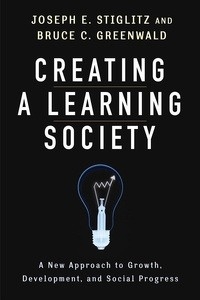Creating a Learning Society
A New Approach to Growth, Development, and Social Progress

Greenwald, Bruce C.
Stiglitz, Joseph E.
Editorial Columbia
Fecha de edición junio 2014 · Edición nº 1
Idioma inglés
EAN 9780231152143
560 páginas
Libro
encuadernado en tapa dura
Resumen del libro
It has long been recognized that most standard of living increases are associated with advances in technology, not the accumulation of capital. Yet it has also become clear that what truly separates developed from less developed countries is not just a gap in resources or output but a gap in knowledge. In fact, the pace at which developing countries grow is largely determined by the pace at which they close that gap.
Therefore, how countries learn and become more productive is key to understanding how they grow and develop, especially over the long term. In Creating a Learning Society, Joseph E. Stiglitz and Bruce C. Greenwald spell out the implications of this insight for both economic theory and policy. Taking as a starting point Kenneth J. Arrow's 1962 paper "Learning by Doing," they explain why the production of knowledge differs from that of other goods and why market economies alone are typically not efficient in the production and transmission of knowledge. Closing knowledge gaps, or helping laggards learn, is central to growth and development.
Combining technical economic analysis with accessible prose, Stiglitz and Greenwald provide new models of "endogenous growth," upending the received thinking about global policy and trade regimes. They show how well-designed government trade and industrial policies can help create a learning society; explain how poorly designed intellectual property regimes can retard learning; demonstrate how virtually every government policy has effects, both positive and negative, on learning; and they argue that policymakers need to be cognizant of these effects. They provocatively show why many standard policy prescriptions, especially associated with "neoliberal" doctrines focusing on static resource allocations, impede learning and explain why free trade may lead to stagnation, while broad based industrial protection and exchange rate interventions may bring benefits, not just to the industrial sector, but to the entire economy.
The volume concludes with brief commentaries from Philippe Aghion and Michael Woodford, as well as from Nobel Laureates Kenneth Arrow and Robert Solow.
Biografía del autor
Bruce Greenwald es catedrático emérito Robert Heilbrunn de Finanzas y Gestión de Activos en la Columbia Business School y director académico del Heilbrunn Center for Graham x{0026}amp; Dodd Investing. Descrito por The New York Times como un gurú para los gurús de Wall Street , Greenwald es una autoridad en inversión de valor y ha sido premiado en numerosas ocasiones por su extraordinaria capacidad docente. Además, es consultor de mercados de capitales, estrategia empresarial, finanzas corporativas y rendimiento laboral.
Biografía del autor
x{0026}lt;P x{0026}lt;B Joseph E. Stiglitzx{0026}lt;/B , Premio Nobel de Economía en 2001, es actualmente catedrático de economía en la Universidad de Columbia tras una intensa carrera académica en prestigiosas universidades, como Yale, Oxford y Stanford. Además, ha sido asesor económico del gobierno de Bill Clinton y economista jefe y vicepresidente senior del Banco Mundial. Autor del x{0026}lt;I bestsellerx{0026}lt;/I internacional x{0026}lt;I El malestar en la globalizaciónx{0026}lt;/I (Taurus, 2002), también ha publicado x{0026}lt;I Los felices 90x{0026}lt;/I (Taurus, 2003), x{0026}lt;I Cómo hacer que funcione la globalizaciónx{0026}lt;/I (Taurus, 2006), Cx{0026}lt;I omercio justo para todosx{0026}lt;/I (Taurus, 2007), x{0026}lt;I La guerra de los tres billones de dólaresx{0026}lt;/I (Taurus, 2008), x{0026}lt;I Caída librex{0026}lt;/I (Taurus, 2010) y x{0026}lt;I El precio de la desigualdadx{0026}lt;/I (Taurus, 2012).x{0026}lt;/P








